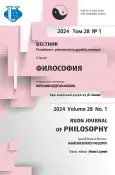Б. Барадин о буддизме: история тезисов к несостоявшейся лекции
- Авторы: Нестеркин С.П.1
-
Учреждения:
- Институт монголоведения, буддологии и тибетологии, Сибирское отделение Российской академии наук
- Выпуск: Том 28, № 1 (2024): ФИЛОСОФИЯ БУДДИЗМА МАХАЯНЫ
- Страницы: 120-125
- Раздел: ФИЛОСОФИЯ БУДДИЗМА МАХАЯНЫ
- URL: https://journal-vniispk.ru/2313-2302/article/view/325450
- DOI: https://doi.org/10.22363/2313-2302-2024-28-1-120-125
- EDN: https://elibrary.ru/ZZXNZT
- ID: 325450
Цитировать
Полный текст
Аннотация
Работа служит введением к публикации тезисов Б. Барадина (1878-1937) к лекции А. Доржиева (1853-1938), которая должна была быть прочитана на международной буддийской выставке, планировавшейся в Ленинграде в 1927 г. Автор подробно останавливается на биографиях бурятского академического ученого Б. Барадина, а также его буддийского наставника геше А. Доржиева, по просьбе которого он составил тезисы. Обращаясь к истории первой буддийской выставки, которая прошла в период гражданской войны в 1919 г., автор отмечает вклад в нее академических ученых С.Ф. Ольденбурга, Б.Я. Владимирцова, Ф.И. Щербатского и О.О. Розенберга. Особо подчеркнута роль Щербатского, который стремился представить буддизм как совершенно уникальную религию, созвучную современной науке и не основанную на слепой вере. Это должно было выставить буддизм в выгодном свете перед большевиками и советской властью и предотвратить гонения на него. Отмечен вклад Щербатского в идеологию буддистского обновленческого движения, деятели которого стремились к сотрудничеству с атеистической властью. Обсуждаются исторические обстоятельства, в которых готовилась вторая, уже международная, выставка и причины, в силу которых она не могла состоятся. Останавливаясь на содержании тезисов Барадина, автор подчеркивает, что в них главным была близость буддизма идеологии Запада и современной науке. В заключении автор отмечает, что тема сближения буддизма и науки предвосхитила современные западные научные исследования буддийских медитативных практик, а также дискуссии западных ученых и Далай ламы о пользе буддийских психопрактик для современного мира.
Ключевые слова
Об авторах
Сергей Петрович Нестеркин
Институт монголоведения, буддологии и тибетологии, Сибирское отделение Российской академии наук
Автор, ответственный за переписку.
Email: sn3716@yandex.ru
ORCID iD: 0000-0003-3055-5026
доктор философских наук, ведущий научный сотрудник, отдел философии, культурологии и религиоведения
Российская Федерация, 670047, Улан-Удэ, ул. М. Сахьяновой, д. 6Список литературы
- Andreev AI. Tibet in the Politics of Tsarist, Soviet and Post-Soviet Russia. Saint Petersburg: Saint Petersburg State University Publishing House; Publishing house of A. Terentyev “Nartang”; 2006. (In Russian).
- Baradin B. Life in the Tangut Monastery of Labrang: Diary of a Buddhist Pilgrim (1906—1907). Ulan-Ude: BNC SB RAS publ.; 2002. (In Russian).
- aydakov VTs. About the Work of B. Baradin. Banzarov readings dedicated to the 170th anniversary of the birth of D. Banzarov: Abstract. report scientific conf. Ulan-Ude: BNC SB RAS publ.; 1992. P. 92—106. (In Russian).
- Oldenburg SF, Vladimirtsov BYa, Shcherbatskoy FI, Rosenberg OO. The Life of Buddha, Indian Teacher of Life: Five Lectures on Buddhism. Samara: Agni publ.; 1998. (In Russian).
- Shcherbatskoy FI. The Philosophical Teaching of Buddhism. Lecture given at the 1st Buddhist Exhibition in St. Petersuburg. Saint Petersburg; 1919. (In Russian).
- Nesterkin S. The main trends in the renewal movement of Russian Buddhism in early 20th century. SENTENTIA. European Journal of Humanities and Social Sciences. 2019;(1):16—23. https://doi.org/10.25136/1339-3057.2019.1.28385
- Nesterkin SP. A Russian Buddhist in Search of Tradition: Letters from A.V. Barchenko to G. Tsybikov. In: Buddhist Studies. Religious Almanac. Vol. 1. Ulan-Ude: BSC SB RAS publ.; 2018. P. 125—149. (In Russian).
Дополнительные файлы









